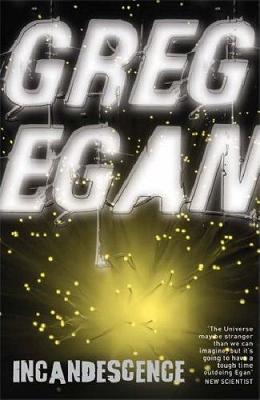As for every human born since the Stone Age, as for the ancestors of every member of the Amalgam, there was nothing the universe was capable of doing that the Arkdwellers were not capable of comprehending. They were not mere clever-looking animals, with some hard-wired repertoire of impressive but inextensible skills. With sufficient motivation and freedom from distractions – and perhaps a modest boost in longevity – they could have grasped anything. Apart from the subjectivities of art or language, where everyone needed tweaking to cross the species barriers, there was nothing in the Amalgam’s million-year-old storehouse of knowledge that would have been beyond their reach. That was the ability, the potential in every one of them. There was, however, no drive to realize it: no curiosity, no joy in discovery, no restlessness, no dissatisfaction.
– Greg Egan in Incandescence

(After thinking about it for a while, I’ve decided to write a discussion of the novel rather than a review. There are already plenty of reviews on it available on the net, most of them probably better than anything I would be able to come up with. For a favourable review, check this out. For a dissenting opinion, read this and maybe Egan’s rather fierce rebuttal to same.)
Cracking open a new Greg Egan novel is always a momentous occasion for me and since Incandescence is the author’s first new novel in six years, you can imagine how great the anticipation must have been. At the end of it however, I’m left with mixed feelings. On the one hand, I can recognize the tremendous amount of work that must have gone into it and on a purely intellectual level, can’t help but be impressed by it. On the other hand, with not much to go on in the way of plot or characters, I had a hard time being emotionally engaged in the book. In that sense, it may be a work of fiction, but it’s more of an extended thought experiment than a novel.
Incandescence is essentially a detailed but dramatized imagining of how a pre-Industrial society with simple, unpowered hand tools could believably arrive at the theory of general relativity. The entire novel is set up to create a plausible scenario whereby this could happen as Greg Egan explicitly lays out on his website. As he further explains, he writes on the premise that mathematics and the sciences are intrinsically interesting which is why it is the science itself that is the star of the show rather than any of the characters. Since the process by which the characters in the novel develop the theory is very different from how it actually happened in really life, it goes without saying that it is absolutely impossible for the reader to really understand and appreciate what’s going on without a very solid grounding in the theory itself.
Granted, this is Egan we’re talking about here and anyone who didn’t have the requisite patience and interest in science would have been weeded out long ago. Still, fully understanding the theory of general relativity, as Egan puts it one of the pinnacles of human intellectual achievement, is a herculean hurdle to leap and one that I’m only a little chastened to admit is somewhat beyond my limited capacities. What’s more is that since the development of the theory takes place in an alien environment with very different conventions and an entirely separate set of nonclementure, you’d need to adapt what you know of the theory to fit the scheme that Egan proposes. The author suggests that the reader take notes.
I’d guess that most readers would, like me, end up skimming through those parts of the book but that would leave very little else of interest. One aspect of the story about the loneliness of the intectually awakened and curious struck a chord in me but Egan never really develops that strand of thought. It’s not like Egan can’t write emotionally engaging stuff but it appears that he has abandoned that approach for the nobler ideal of seeking the beauty in pure science and mathematics. Previous Egan novels have been chock full of interesting ideas to ruminate on, but this one sticks to its one conceit and pursues it single-mindedly.
Now, you might say that if I shouldn’t have bought the book if I hadn’t been interested in reading about how the theory of general relavity might have been developed in an alternate history. Except that I really had no idea that this would be what the book was about. Riding the Crocodile, the short story that served to introduce the universe of Incandescence and was published nearly three years before the novel was a different kind of beast entirely and implied that the novel would be about discovering the motives and origins of the mysterious Aloof. As it happens, the novel does eventually, in a sorta, maybe way, answer that question, but so briefly and so shallowly that I felt cheated.
All of this means that this is the first novel of Egan’s that has disappointed me. As I’ve said, I’m still tremendously impressed by it and I hope to one day be able to sit down with it in one hand and a good physics textbook in the other to fully work through everything. Probably not any time soon though.
One thought on “A Book: Incandescence”